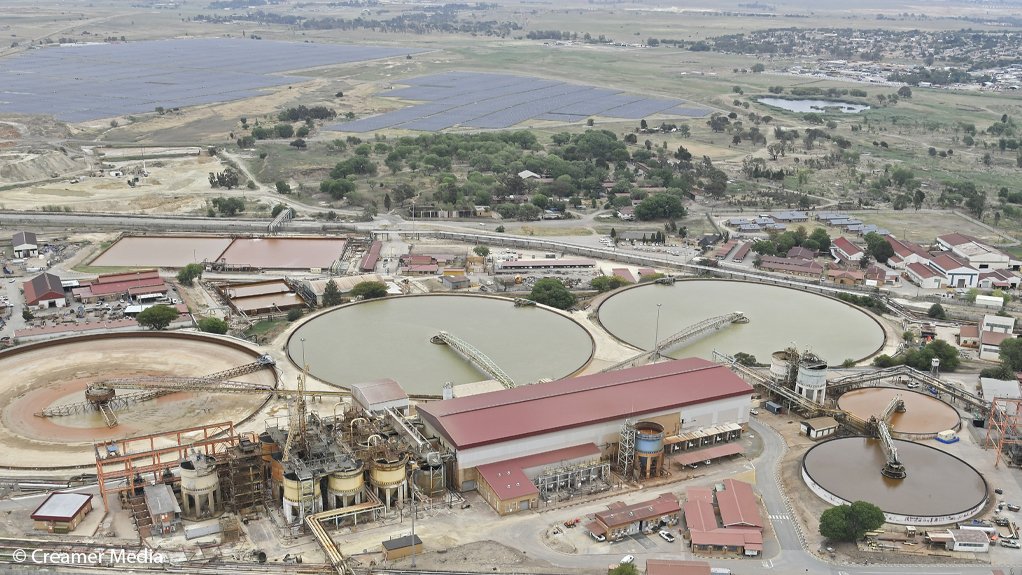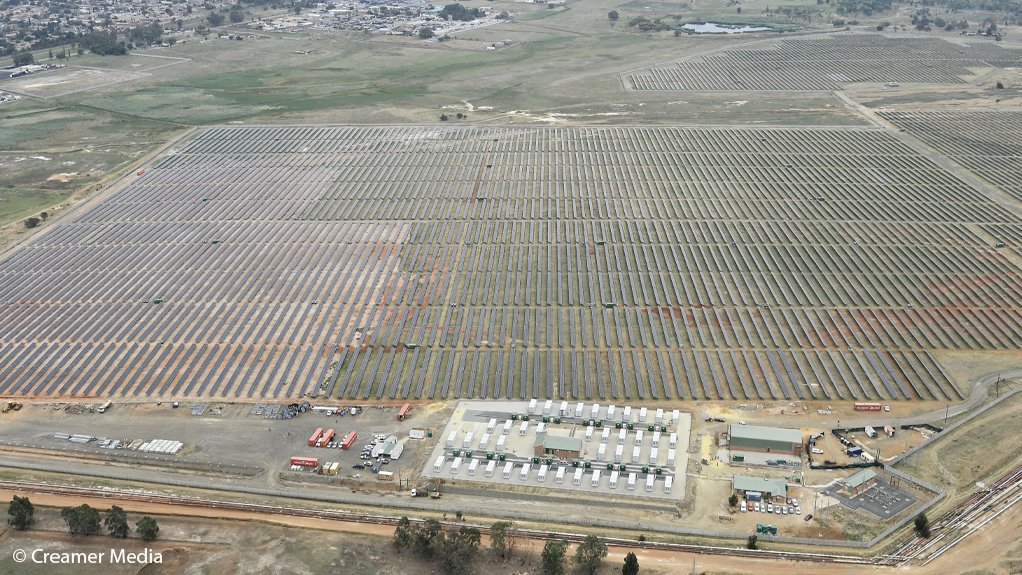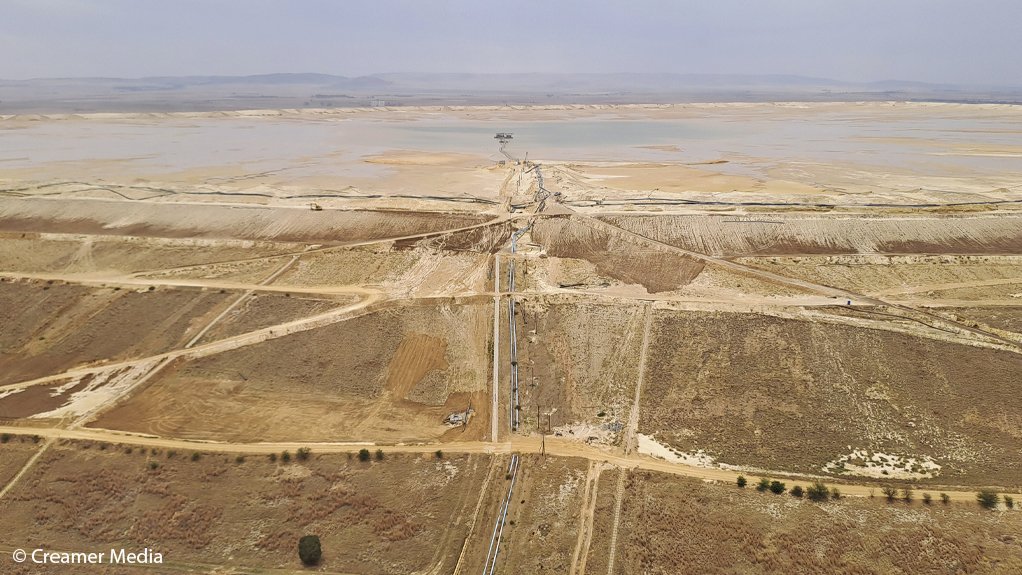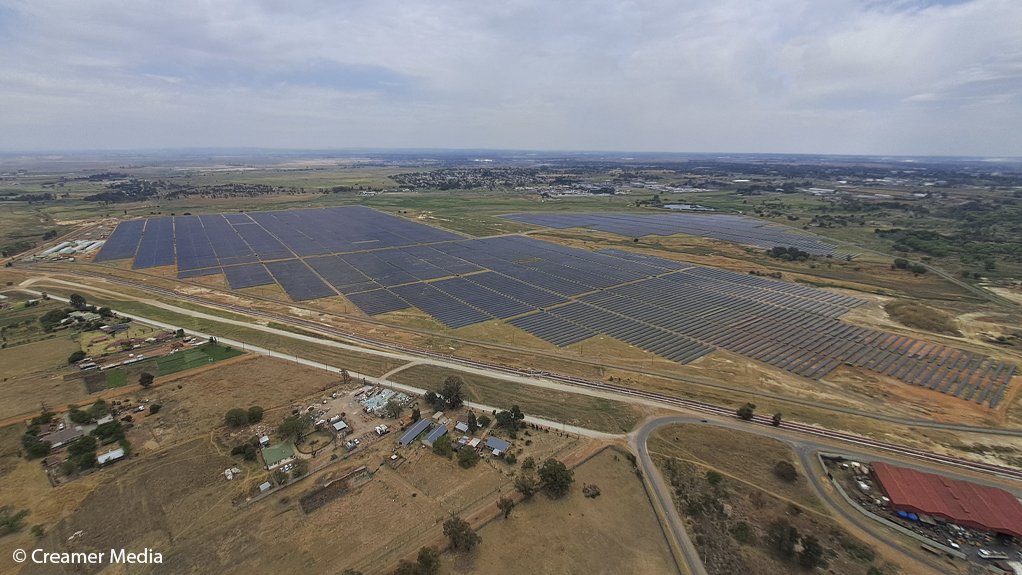JOHANNESBURG (miningweekly.com) – The large solar electricity plant at DRDGOLD’s Ergo gold tailings retreatment operation has received a formal grid connection certificate from Eskom, Ergo reported ahead of flying journalists over the operation’s expansive array of solar panels and batteries, which provide a collective 187 MW of installed capacity.
“We run the plant off the batteries whilst being fully grid connected the whole time,” Ergo COO Jaco Schoeman explained as we helicoptered over 133 000 solar panels and 43 batteries that make up the R2.8-billion in-house, on-balance-sheet Tshedza solar farm - Tshedza being Venda for ‘let there be light’. (See attached Creamer Media pictures).
It is estimated that the Tshedza circuit will reduce group CO2 emissions by 52%.
The grid connection enables the operation to offset excess power generated against Ergo’s other power accounts, journalists heard after being seen off at Rand Airport by DRDGOLD CEO Niël Pretorius and accompanied on the helicopter by Ergo MD Henry Gouws and Schoeman.
A constant feed of stable power into the circuit is crucial. If the Ergo plant loses power for three minutes, operation will cease for four to five hours, owing to the constant flow of gold-bearing slurry coming into it from as far afield as Soccer City, which is some 50 km away.
“Hence the batteries,” it was explained to Mining Weekly as the overhead flight also provided views of pylons, overhead transmission lines and substations that have been constructed by DRDGOLD as part of the overall power circuit, which was designed and built by Enerj.
The battery and solar circuit allows the plant to run from six o'clock in the morning to nine o'clock at night, which provides the operation with additional daytime solar power to go back into the grid.
At night, it is possible for power to also be evacuated back into the grid from the battery, and in that way sweat the asset, which is not currently planned.
“But if we need to, we’re in a position to do so,” was Schoeman’s comment on potentially getting additional return out of the structure.
“In total, we've got about 29 various Eskom and municipal accounts at Ergo and we’re offsetting the power that we push back into the grid against all our other accounts.
“So, we're not selling power to third parties. It's all in-house consumed, but it's offset against other accounts, and for that, it was important for us to get a formal grid connection certificate, which we received last week. You need to be able to wheel energy and that's what we've got in the circuit,” said Schoeman.
Installed capacity provides three hours of peak discharge and a two-hour backup for ramp-down, if required.
Regarding the lowering of CO2 emissions beyond Tshedza's 52%, Schoeman said: “The expansion of our Far West Gold Recoveries operations will add energy consumption, so we’re looking at alternative solar projects to reduce emissions back down as far as possible."
The back-end of Tshedza’s bifacial panels provide 18% additional electricity from ground-up reflection.
They also track the sun and have the highest current hail resistance rating. Every barcoded panel has stated output capacity and switch-on date.
“We've got back-to-back agreements with the original equipment manufacturers so you've got to make sure that you stay within that window of operation to ensure that your warranties and guarantees are in place.”
Interestingly, members of the same team that designed and built the plant have now been upskilled to operate and manage it as well.
More than 250 local community members were employed to do panel installation and cable laying.
Visible from the air was the maintenance warehouse, which is part of a R15-million outsourced social community contract that places strong emphasis on health and safety.
Established is a company called Carbon Works, which is 100% focused on the operation and maintenance of the Ergo power plant and which forms part of Ergo’s management team.
TAILINGS DAM CONSOLIDATION
The Ergo plant has a nameplate capacity of about 2.2-million tons a month. When Anglo American constructed it in 1978, there was very little development around it but a significant volume of tailings, which is why the plant was constructed there.
As Mining Weekly observed during the flight, the many smaller gold tailings dams between developed areas are continuing to be consolidated, with only 80 to 90 of the hundreds that were there now remaining.
Visible from the air was the large Brakpan tailings facility, as well as the large Rooikraal mining site and envisaged Withoek tailings dam. Also noticeable was concurrent rehabilitation as well as dust and water management activity.
The land from which the tailings are removed becomes available for property development.
Johannesburg- and New York-listed DRDGOLD reported revenue of R6 239.7-million and a total operating profit of R2 081.3-million in the 12 months to June 30.
EMAIL THIS ARTICLE SAVE THIS ARTICLE ARTICLE ENQUIRY
To subscribe email subscriptions@creamermedia.co.za or click here
To advertise email advertising@creamermedia.co.za or click here

















